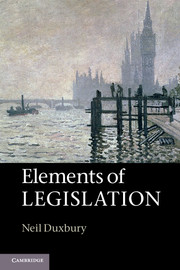4 - Legislatures and intentions
Published online by Cambridge University Press: 05 December 2012
Summary
Legisprudence, once cast as an argument in favour of majority decision and against judicial review of the constitutionality of legislation, looks to be a more provocative project than it has ever appeared hitherto. But it would be uncharitable to suggest that legisprudence offers only one argument of note; it has on its agenda certainly one other topic of long-standing concern to jurists and political theorists, a topic which ranks as one of the core conundrums of legal philosophy. This is the problem of legislative intent. If intentions can reasonably be ascribed to legislatures, then courts and other interpretive agencies – if they are to abide by the separation of powers doctrine, and if they are to treat legislatures as vested with a mandate to enact laws for the citizenry – have a prima facie obligation to strive to respect those intentions. But how, if at all, could it ever make sense to speak of ‘legislative intent’, given that legislatures, as corporate bodies, cannot form and act on intentions as individual agents do?
One response to this question delivers it short shrift. If we accept that ‘one cannot look at the marks on a page and understand those marks to be a text (i.e., a meaningful writing) without assuming that an author made those marks intending to convey a meaning by them’, then it matters not whether the text is ascribed to an individual or corporate author. The text was intended. Interpreting a statute simply means working out (and, if we are to avoid interpolation, not going beyond) the intention of the statute’s author in the same way that we work out a speaker’s intention in everyday life – by taking into account not only the words used but also what we know about the author and the context of the author’s pronouncement. If there appear to be inconsistent intentions embodied in a legislature’s rules, the interpreter should take it that ‘the meanings of the rules are … what binding effects the rule maker would declare the rules to have when confronted with such conflicts and inconsistencies’. The fact that intentions may be difficult to discern – because of such inconsistencies, or because legislators sometimes use words which express more or less than what they meant to say, or because a legislature may have more than one intention when enacting a statute – does not mean that no legislative intention exists. It has to exist. There cannot be a statute without it.
- Type
- Chapter
- Information
- Elements of Legislation , pp. 92 - 120Publisher: Cambridge University PressPrint publication year: 2012



